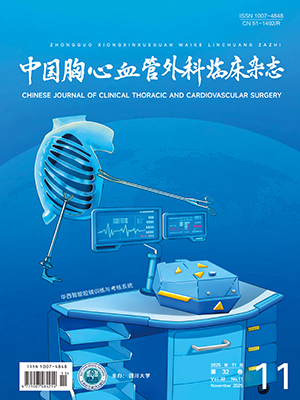| 1. |
LaPar DJ, Kron IL. Should all ischemic mitral regurgitation be repaired? When should we replace? Curr Opin Cardiol, 2011, 26(2): 113-117.
|
| 2. |
Acker MA, Parides MK, Perrault LP, et al. Mitral-valve repair versus replacement for severe ischemic mitral regurgitation. N Engl J Med, 2014, 370(1): 23-32.
|
| 3. |
He S, Fontaine AA, Schwammenthal E, et al. Integrated mechanism for functional mitral regurgitation: Leaflet restriction versus coapting force: In vitro studies. Circulation, 1997, 96(6): 1826-1834.
|
| 4. |
Benfari G, Dandale R, Rossi A, et al. Functional mitral regurgitation: Are we treating the real target? J Cardiovasc Med (Hagerstown), 2016, 17(11): 767-773.
|
| 5. |
Ozawa T, Kawasaki Y, Suenaga E. Coronary artery bypass grafting and mitral annuloplasty in a patient with left ventricular noncompaction with low ejection fraction: Report of a case. Kyobu Geka, 2021, 74(9): 672-675.
|
| 6. |
Khallaf A, Elzayadi M, Alkady H, et al. Results of coronary artery bypass grafting alone versus combined surgical revascularization and mitral repair in patients with moderate ischemic mitral regurgitation. Heart Surg Forum, 2020, 23(3): E270-E275.
|
| 7. |
Ferket BS, Thourani VH, Voisine P, et al. Cost-effectiveness of coronary artery bypass grafting plus mitral valve repair versus coronary artery bypass grafting alone for moderate ischemic mitral regurgitation. J Thorac Cardiovasc Surg, 2020, 159(6): 2230-2240.
|
| 8. |
Chen XJ, Liu DX, Huang KL, et al. Interpretation of the American Association for Thoracic Surgery expert consensus document: Coronary artery bypass grafting in patients with ischemic cardiomyopathy and heart failure in 2021. Zhonghua Yi Xue Za Zhi, 2021, 101(36): 2825-2830.
|
| 9. |
Teng Z, Ma X, Zhang Q, et al. Additional mitral valve procedure and coronary artery bypass grafting versus isolated coronary artery bypass grafting in the management of significant functional ischemic mitral regurgitation: A meta-analysis. J Cardiovasc Surg (Torino), 2017, 58(1): 121-130.
|
| 10. |
Dufendach K, Aranda-Michel E, Sultan I, et al. Outcomes of mitral valve surgery for severe ischemic mitral regurgitation. J Card Surg, 2020, 35(2): 390-396.
|
| 11. |
Wang TKM, Liao YB, Choi D, et al. Mitral valve surgery with or without coronary bypass grafting: Eight-year cohort study. N Z Med J, 2019, 132(1500): 50-58.
|
| 12. |
金岩, 王辉山, 姜辉, 等. 影响缺血性心肌病血运重建后左心室射血分数的多因素分析. 中国胸心血管外科临床杂志, 2018, 25(12): 1043-1048.
|
| 13. |
Min D, Popović ZB. Mitral valve adaptation in ischemic heart disease. J Am Coll Cardiol, 2016, 67(3): 288-290.
|
| 14. |
Silbiger JJ. Novel pathogenetic mechanisms and structural adaptations in ischemic mitral regurgitation. J Am Soc Echocardiogr, 2013, 26(10): 1107-1117.
|
| 15. |
张永, 汪曾炜, 陶登顺, 等. 中度缺血性二尖瓣反流外科治疗的近期疗效. 中华胸心血管外科杂志, 2016, 32(6): 340-345.
|
| 16. |
Salehi M, Bakhshandeh A, Rahmanian M, et al. Coronary artery bypass grafting in patients with advanced left ventricular dysfunction: Excellent early outcome with improved ejection fraction. J Tehran Heart Cent, 2016, 11(1): 6-10.
|
| 17. |
Zhang H, Liu Y, Qiu S, et al. Short-term and long-term survival after revascularization with or without mitral valve surgery of patients with ischemic mitral valve regurgitation: A meta-analysis. Med Sci Monit, 2015, 21: 3784-3791.
|
| 18. |
Writing Committee Members, Otto CM, Nishimura RA, et al. 2020 ACC/AHA guideline for the management of patients with valvular heart disease: A report of the American College of Cardiology/American Heart Association Joint Committee on Clinical Practice Guidelines. J Am Coll Cardiol, 2021, 77(4): e25-e197.
|
| 19. |
Virk SA, Tian DH, Sriravindrarajah A, et al. Mitral valve surgery and coronary artery bypass grafting for moderate-to-severe ischemic mitral regurgitation: Meta-analysis of clinical and echocardiographic outcomes. J Thorac Cardiovasc Surg, 2017, 154(1): 127-136.
|




